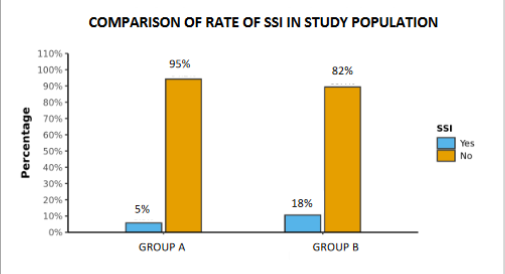Effect of Pre-Operative Vaginal Cleansing on Surgical Site Infections Post Caesarean Delivery
Main Article Content
Abstract
Background: As rate of caesarean section is increasing alarmingly, so are its complications. The most common complication being “surgical site infections (SSIs)”. Infections following surgery, close to or at the site of the incision, or deeper underlying tissue spaces and organs within 30 days of a surgical procedure are referred to as SSIs. The aim of this study was to determine the effect of pre-operative vaginal cleansing in prevention of post-operative SSIs and hence reducing post-operative morbidity and hospital stay.
Methods: This was a prospective interventional cohort study which was conducted on all the pregnant women undergoing caesarean section at our institute, either emergency or elective who met the inclusion criteria. It was done over a period of 2 months, which included a total of 200 women. These women were allocated in two groups by randomization.
All the women in group A (interventional group) underwent pre-operative vaginal cleansing with 5% povidone iodine while the women in the group B (control group) did not receive any intervention.
All pregnant women in both the groups received all standard preoperative, intraoperative and postoperative measures as per hospital guidelines
All these women were followed for a period of 30 days for surgical site infections (SSI). SSIs were classified as superficial, deep and organ space infections as per Centre for Disease Control (CDC). In women who presented with SSI either incisional or organ space, discharge from surgical incisional site was collected with sterile cotton swabs and was sent for culture and sensitivity. Antibiotics were given as per antibiotic susceptibility of the isolated organism. Results of both the groups were studied and compared.
“Statistical analysis was done and qualitative variables were analysed using Chi-square test/ Fisher’s exact test. A p-value of <0.05 was considered statistically significant”.
Results: The rate of SSI in pregnant women allocated in group A, i.e the group who received pre-operative vaginal cleansing was 5% (5 out of 100) whereas rate of SSI in group B, i.e control group was 18% (18 out of 100). Rate of SSI was found to be higher in group B than the group A and the difference was statistically significant with a p value of 0.0039.
“In group A, 3 patients (3%) had superficial incisional SSI, 1 patient (1%) had deep incisional SSI and 1 patient (1%) had organ space SSI. In group B, 10 patients (10%) had superficial SSI, 4 patients (4%) had deep incisional SSI and 4 patients (4%) had organ space SSI including endometritis”.
Conclusions: Pre-operative vaginal cleansing in patients undergoing caesarean section helps in reduction of incisional and organ space SSIs.
Article Details
References
Betran AP, Ye J, Moller AB, Zhang J, Gulmezoglu AM, Torloni MR. The increasing trend in caesarean section rates: global, regional and national estimates:1990-2014. PLoS One. 2016;11:e0148343.
Nidhi J. Led by Wealthy Urban Women, Caesarean Sections rise in India. Available from: http://archive.indiaspend.com/cover-story/led-by-wealthy-urban-women-caesarean-sections-rise-in-india-45728. [Last accessed September 6, 2019].
Kawakita T, Landy HJ. Surgical site infections after caesarean delivery: epidemiology, prevention and treatment. Matern Health Neonatol Perinatol. 2017;3:12.
Borchardt RA, Tzizik D. Update on surgical site infections: The new CDC guidelines. JAAPA. 2018;31:52-4.
A. Mathew, R. Franklin, A. William., “Performance standards for antimicrobial susceptibility testing,” Clinical and Laboratory Standards Institute, vol. 26, supplement 16, 2006.
Haas DM, Morgan S, Contreras K, Kimball S. Vaginal preparation with antiseptic solution before caesarean section for preventing postoperative infections. Cochrane Database of Systematic Reviews. 2020.
Haas DM, Morgan S, Contreras K, Enders S. Vaginal preparation with antiseptic solution before caesarean section for preventing postoperative infections. Cochrane Database Syst Rev 2018;7:CD007892.
Caisutti C, Saccone G, Zullu F, Quist-Nelson J, Felder L, Ciardulli A, Berghella V. Vaginal cleansing before caesarean delivery: a systematic review and meta-analysis. Obstet Gynecol. 2017;130:527-38.
Devi SL, Durga DV. Surgical site infections post caesarean section. Int J Reprod Contraception, Obstet Gynecol 2018;7:2486.
Nandi JK, Saha DP, Pal S, Barman S, Mitra A. Antiseptic vaginal preparation before caesarean delivery to reduce post operative infection: a randomised controlled trial. JMSCR. 2015;3:4310-5.
Mohammad H, Hassan S, Hemida R. Vaginal preparation with antiseptic solution before caesarean section for reducing post partum morbidity. OSR-JNHS. 2015;4:75-80.

